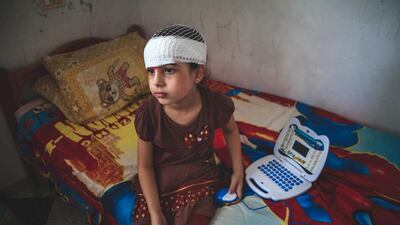GAZA // Inside the waiting room of a Gaza clinic, a small girl with her head bandaged sits on a stool, looking at her toes.
A nurse leads Bisan Daher, 8, to a curtained treatment room, lifts her on to the black vinyl treatment bed and playfully puts gauze bandages on her legs and arms like pretend leg warmers.
Slowly, Bisan emerges from her shell and breaks into a smile. She is distracted enough for the nurse to remove the dressing from her head.
Bisan has lost an eyebrow and suffered a deep wound to her forehead, but her emotional scars run much deeper: she lost her mother and father, four brothers and sisters and a niece when an Israeli F16 jet bombed her family home.
Bisan is one of 1,500 children who lost both their parents during Israel’s 50-day war on Gaza in the summer. The same United Nations statistics say 373,000 children in Gaza will need psychological support because of the war, as most lost someone they knew. and often their homes too.
Orphaned children cannot be legally adopted under Sharia, but they can be cared for through permanent fostering relationships that are similar to adoptions.
Bisan is being looked after by her family and now lives in central Gaza with her remaining married sister Noha, 28, and her four children.
Inside the small third-floor apartment in a relatively leafy neighbourhood. Bisan sits in the corner of the bedroom she shares with two nieces.
“I really want to see my mum and dad again,” she says weakly as she looks towards a small plastic toy dressing table with a cloudy mirror.
The little girl is mostly speechless and lacks expression. Nearly four months after the fighting stopped, she still requires daily checkups and dressing of her wounds at the clinic run by the charity Doctors Without Borders.
“I try to keep her engaged playing with other children. I tell her stories and play with her. I do my best to keep her busy by asking her to arrange her toys,” Noha says.
Bisan lay unconscious and buried under rubble for six hours after the air strike on her home.
She draws a lot of pictures of aircraft in the sky, tanks and ambulances but then she scribbles out the images and rips them up.
“What terrifies her the most is the sound of the ambulance,” says Noha. “She will say the ambulance is coming to get us because they are going to strike the home, let’s go and leave the home.
“When she’s asleep she wakes up suddenly crying, calling out to ask what has happened. Since the incident until today she hasn’t been able to sleep well in the night. She doesn’t sleep. As you see she is always silent. She was very active before.”
Mohemmed Abu Rayya, 28, a psychologist for the UN children’s agency in Gaza, lost a friend in the war, and the apartment where he lived with his wife and their two children was destroyed.
He says Unicef were trying to help nearly 6,500 children in Gaza, many of whom are living in temporary shelters. Some of the signs of emotional damage are only now emerging.
“Trauma usually takes more than two months after the crisis to come out,” he says.
The symptoms in children were usually behavioural — anger, anxiety and often scratching, bedwetting and clinging to adults in fear.
Inside their spacious family home in Khan Younis, the family of two-year-old Jana Abu Jaber argues over who will take care of her and her brother Yamen, 4, after their parents were killed in Al Burej refugee camp.
Sami Musleh says he would probably get to have his niece and nephew only at the weekends. His sister Somaya, 32, and her husband were killed when Israel blew up the small apartment block in which they lived.
Mr Musleh accepts that Jana’s uncle on her father’s side will be the sole carer of Jana and her brother during the week.
“Everybody wants to keep her,” Mr Musleh says. “Eventually she will be staying with her uncle from her father’s side because he lost 18 members of his family. We here have only lost one, Jana’s mother.
“On the other hand her grandmother is here and she wants her granddaughter here because she reminds her of her mother.
“It’s confusing for Jana; she calls everybody Mum.” he says.
Jana plays with her cousin Nourhan, 11, in a big, well furnished living room.
She has an array of toys — colourful Lego-like blocks and a doll. It is clear she will be well taken care of.
Her brother Yamen is still being treated in a hospital in Jerusalem for major burns suffered in the bombing.
Jana was virtually unharmed after a pillar fell close to her and sheltered rather than crushed her, but Yamen was thrown by the blast.
Sami remembered his sister Somaya as kind and they had sent each other messages via Facebook on the day of Eid.
He will always remember the day he had to bury his sister near the Burej refugee camp.
foreign.desk@thenational.ae

